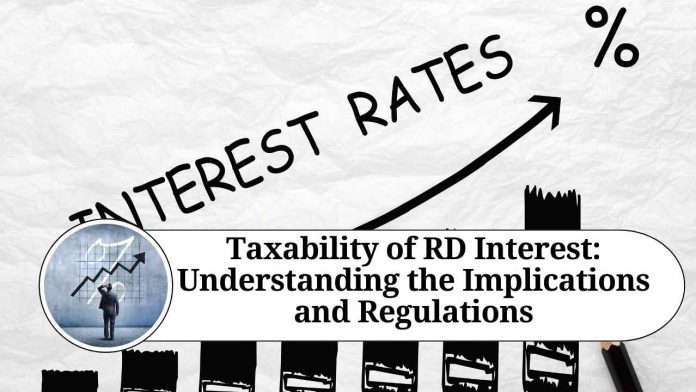Introduction
Recurring Deposit (RD) is a popular investment option in India that allows individuals to save money on a regular basis and earn interest on their deposits. Similar to fixed deposits, RDs provide a fixed interest rate for a predetermined period. However, one crucial aspect that investors must consider is the taxability of RD interest. In this blog post, we will explore the tax implications of RD interest and provide you with the information you need to understand how it affects your overall income.
Taxability of RD Interest
The interest earned on a recurring deposit is subject to taxation under the Income Tax Act, 1961. RD interest is considered a part of your total taxable income and is subject to tax as per your applicable income tax slab rate. The interest earned is added to your annual income and taxed accordingly.
Tax Deducted at Source (TDS)
Banks and financial institutions deduct Tax Deducted at Source (TDS) on RD interest if it exceeds a specified threshold. The current TDS threshold for RD interest is ₹40,000 per financial year. If the total interest earned on your RDs from a particular bank exceeds this threshold, the bank is required to deduct TDS at the prescribed rate before crediting the interest to your account.
TDS Rates on RD Interest
The TDS rates on RD interest vary based on your PAN (Permanent Account Number) availability. If you have provided your PAN details to the bank, the TDS rate is generally 10%. However, if you haven’t furnished your PAN information, the TDS rate is higher at 20%.
Note: It’s important to provide your PAN to the bank to ensure proper TDS deduction and to avoid higher tax deductions.
Form 15G/15H for Non-Deduction of TDS
Individuals can submit Form 15G or Form 15H to the bank if they meet the specified criteria and wish to avoid TDS deduction on their RD interest. These forms are self-declarations stating that the individual’s income is below the taxable limit, and hence, no TDS should be deducted. Form 15G is for individuals below the age of 60, while Form 15H is for senior citizens (60 years or above).
Taxation of TDS on RD Interest
The TDS deducted on RD interest is not the final tax liability; it is merely an interim deduction. The actual tax liability on the interest earned is determined based on your total taxable income and the applicable income tax slab rates.
Including RD Interest in Income Tax Return
When filing your income tax return, you must include the RD interest earned during the financial year. The interest income should be reported under the head “Income from Other Sources” in your tax return form. Ensure that you accurately disclose the interest earned and the TDS deducted on the interest.
Conclusion
Understanding the taxability of RD interest is crucial for every investor who holds a recurring deposit. The interest earned on RDs is subject to taxation, and the banks or financial institutions deduct TDS if it exceeds a certain threshold. It’s essential to provide your PAN to the bank to ensure proper TDS deduction and avoid higher tax rates. By accurately reporting your RD interest in your income tax return, you can fulfill your tax obligations and maintain compliance with the Income Tax Act.
Other Related Blogs: Section 144B Income Tax Act
Frequently Asked Questions (FAQs)
Q.Is the interest earned on a recurring deposit taxable?
Yes, the interest earned on a recurring deposit is taxable under the Income Tax Act, 1961.
Q.How is the tax calculated on RD interest?
The tax on RD interest is calculated based on your applicable income tax slab rate. The interest earned is added to your total taxable income, and tax is levied accordingly.
Q.What is TDS (Tax Deducted at Source)?
TDS refers to the tax deducted by banks or financial institutions at the time of crediting RD interest to your account. It is deducted to ensure tax compliance and is based on prescribed rates.
Q.What is the current TDS threshold for RD interest?
The current TDS threshold for RD interest is ₹40,000 per financial year. If the total interest earned on your RDs from a particular bank exceeds this threshold, TDS will be deducted.
Q.What is the TDS rate on RD interest?
The TDS rate on RD interest is generally 10% if you have provided your PAN details to the bank. If PAN details are not provided, the TDS rate is higher at 20%.
Q.How can I avoid TDS deduction on my RD interest?
To avoid TDS deduction, you can submit Form 15G (for individuals below 60 years) or Form 15H (for senior citizens) to the bank, stating that your income is below the taxable limit.
Q.Is the TDS deducted on RD interest the final tax liability?
No, the TDS deducted on RD interest is an interim deduction. The actual tax liability is determined based on your total taxable income and applicable income tax slab rates.
Q.How should I report RD interest in my income tax return?
RD interest should be reported under the head “Income from Other Sources” in your income tax return form. Ensure accurate disclosure of interest earned and TDS deducted.
Q.What happens if I don’t disclose RD interest in my tax return?
Non-disclosure of RD interest in your tax return can attract penalties and legal consequences. It is important to report all income sources, including RD interest, to comply with tax laws.
Q.Should I consult a tax professional or financial advisor regarding RD interest taxation?
Yes, it is advisable to seek guidance from a tax professional or financial advisor to ensure proper understanding of tax laws and personalized advice based on your specific financial situation.




















